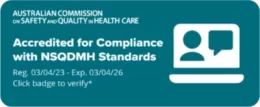Quick Facts
- Schizophrenia impacts a person’s thoughts, perceptions, emotions, and behaviour.
- A key symptom is psychosis, which can involve periods of false beliefs and hallucinations.
- People living with schizophrenia can benefit from self-care strategies, medication, psychological therapies, and community support.
- It is possible to live a full and meaningful life even if a person has experienced schizophrenia.
-
About schizophrenia
Schizophrenia involves changes in how a person perceives and interacts with the world. It can involve sensory changes and distortions, such as seeing hearing, smelling or feeling things others do not. It can also involve having unusual thoughts or beliefs that others do not share. These may occur episodically, or may persist for longer periods.Schizophrenia is part of a category of diagnoses called 'schizophrenia spectrum disorders' or 'psychotic disorders'. These disorders share similar symptoms, especially psychosis. However, they have some differences in symptoms and how long they last. Other schizophrenia spectrum disorders include schizophreniform disorder, schizoaffective disorder, and brief psychotic disorder.
-
Symptoms of schizophrenia
Symptoms of schizophrenia usually develop in the late teens or early 20s – though they can appear later in life, especially in women (1).
One of the main symptoms of schizophrenia is psychosis. A person experiencing psychosis finds it hard to tell what is real from what isn’t. Psychosis is usually experienced in episodes — short periods of intense symptoms.
Symptoms vary from person to person — not everyone experiences the same symptoms – and can also change from episode to episode. To meet a diagnosis of schizophrenia, a person must experience two or more of the following over at least one month:
- Delusions: false beliefs that can’t be changed, even by evidence.
- Hallucinations: hearing voices, or seeing or sensing things that aren’t there.
- Disorganised thinking: unusual or disrupted thoughts and speech.
- Disorganised behaviour: unusual, inappropriate or extreme actions.
- ‘Negative symptoms’: such as low motivation, fewer expressed emotions, feeling less pleasure in everyday life, or difficulties with attention or memory.
Overall, symptoms must appear over at least six months (though this may include periods of wellness in between episodes) (1).
A small number of people living with schizophrenia may act aggressively at times, due to their symptoms. However, it is important to note that people living with schizophrenia are more likely to be survivors of violence than they are to be perpetrators. And, importantly, the vast majority of violence in the community – around 96% – is perpetuated by people who do not experience complex mental health issues like schizophrenia (2).
A person living with schizophrenia is likely to also have trouble managing at least one major area of their life such as work, relationships, or self-care.
-
Recognising schizophrenia
Schizophrenia frequently begins with general changes to someone’s thinking, emotions and behaviour that are hard to pin down. Examples might include preoccupation with a particular subject, withdrawing from relationships or hobbies, or behaving in a way that seems reckless, strange or out of character. These thoughts tend to come and go, but if left untreated, get worse over time.
-
Causes of schizophrenia
There isn’t a single cause of schizophrenia. Genetics play a big role in the risk of developing schizophrenia, meaning people are more likely to develop it if they have a family history (3).
But there are other factors that can increase chances of experiencing schizophrenia. These include early developmental challenges, a person’s brain chemistry, stressful social circumstances, and trauma (particularly in childhood).
There is also a link between substance use and schizophrenia, but this relationship is complex (4).
-
How common is schizophrenia?
Schizophrenia affects roughly 20 million people worldwide (5). In Australia, schizophrenia affects around 2.4 per 1000 people. It is slightly more common in men compared to women (6).
-
Managing life with schizophrenia
Some people living with schizophrenia find that the following strategies can help prevent episodes of psychosis, help them feel better in between episodes, or feel more in control:
- learning more about schizophrenia
- finding an individual definition of recovery, whether it’s reducing symptoms or working on other parts of life like relationships or employment
- looking after physical health including getting regular check-ups
- improving sleep
- developing a support network of trusted family or friends
- accessing peer support
- learning strategies to minimise stress
- developing a Relapse prevention plan including identifying early warning signs, what to do when these occur, and who to contact (and making sure family and a trusted health professional have a copy)
- advance care planning may also be an option for times when a person doesn’t have decision-making capacity. The nature of these statements varies between states.
Every person will need to find what works for them and it’s normal for this to take time. Check out our lived experience tips for managing life with schizophrenia.
-
Treatment and support for schizophrenia
The best place to start in getting a diagnosis is a GP. They can make an assessment and provide a referral to a psychiatrist for full diagnosis and treatment if needed.
Schizophrenia takes time to diagnose – some people might receive a predicted diagnosis of schizophrenia quickly, but it can take six months or longer to be confirmed. A diagnosis may also change over time. For example, after new information or experiences are identified. This is normal.
Early intervention can be helpful. Although the process can be scary, it can be very useful to identify a risk of developing schizophrenia early to develop a care plan. This may include case management, support for families and carers, group programs, and minimising disruptions to school and work (7).
If someone develops schizophrenia, antipsychotic medications are usually a first line of treatment. Psychological therapies can also be beneficial, including cognitive behavioural therapy, psychodynamic therapy, and open dialogue (8). Community support programs are also available to help with social connection, physical health, accommodation, and work or school.
It is important that people experiencing symptoms of schizophrenia collaborate with their healthcare providers and are empowered to make their own treatment choices, wherever possible. Though not always easy, sticking with treatment and medication is important, especially for people experiencing paranoia.
Some people will receive support to manage schizophrenia over many years, often with a team of health professionals. Over time, treatments may be altered to reduce the type or intensity of treatment, improve the results, and reduce side-effects.
-
Help for family & friends
The family and friends of someone with schizophrenia need care and support too — it’s okay for family and friends to prioritise their own mental and physical health while they support someone.
There are many other people out there who share similar experiences, and many services designed to help carers of people with mental health issues. Check out our Guide for Families and Friends for more info.
Effective medical, community, and psychological treatment is available and a person who experiences schizophrenia can live a fulfilling life.
To connect with others who get it, visit our online Forums. They’re safe, anonymous and available 24/7.
-
Resources and Support
- Lifeline – 13 11 14.
- SANE’s free counselling service – phone and online support for people concerned about complex mental health issues.
- For more in-depth information about managing life with schizophrenia, read SANE’s Schizophrenia guide.
- Early Psychosis treatment guide – Orygen.
- Resources for family and friends: Mental health first aid for psychosis, SANE Friends, Family & Carers Forum; Mental Health Carers Australia (formerly ARAFMI).
-
References
1. American Psychiatric Organization. Diagnostic and statistical manual of mental disorders (DSM-5®). American Psychiatric Pub; 2013.
2. Varshney M, Mahapatra A, Krishnan V, Gupta R, Deb KS. Violence and mental illness: what is the true story? J Epidemiol Community Health [Internet]. 2016 Mar 1;70(3):223 LP – 225. Available from: http://jech.bmj.com/content/70/3/223.abstract
3. Chou I-J, Kuo C-F, Huang Y-S, Grainge MJ, Valdes AM, See L-C, et al. Familial aggregation and heritability of schizophrenia and co-aggregation of psychiatric illnesses in affected families. Schizophr Bull. 2017;43(5):1070–8.
4. Blanchard JJ, Brown SA, Horan WP, Sherwood AR. Substance use disorders in schizophrenia: Review, integration, and a proposed model. Clin Psychol Rev [Internet]. 2000;20(2):207–34. Available from: https://www.sciencedirect.com/science/article/pii/S0272735899000331
5. Anderson JS, Crump D. Borderline Personality Disorder: A View from the Trenches, with Special Attention to its Impact on Family Transition. J Fam Stud [Internet]. 2004;10(2):254–72. Available from: http://ezproxy.acu.edu.au/login?url=http://search.ebscohost.com/login.aspx?direct=true&db=psyh&AN=2004-21148-008&site=ehost-live&scope=site
6. Morgan VA, Waterreus A, Jablensky A, Mackinnon A, McGrath JJ, Carr V, et al. People living with psychotic illness in 2010: The second Australian national survey of psychosis. Aust New Zeal J Psychiatry [Internet]. 2012 Jun;46(8):735–52. Available from: http://dx.doi.org/10.1177/0004867412449877
7. Henry LP, Amminger GP, Harris MG, Yuen HP, Harrigan SM, Prosser AL, et al. The EPPIC follow-up study of first-episode psychosis: longer-term clinical and functional outcome 7 years after index admission. J Clin Psychiatry. 2010;71(6):6560.
8. Cooper RE, Laxhman N, Crellin N, Moncrieff J, Priebe S. Psychosocial interventions for people with schizophrenia or psychosis on minimal or no antipsychotic medication: A systematic review. Schizophr Res. 2020;225:15–30.
SANE factsheets provide brief, introductory information about mental health. For more in-depth information, read SANE’s Schizophrenia guide.










